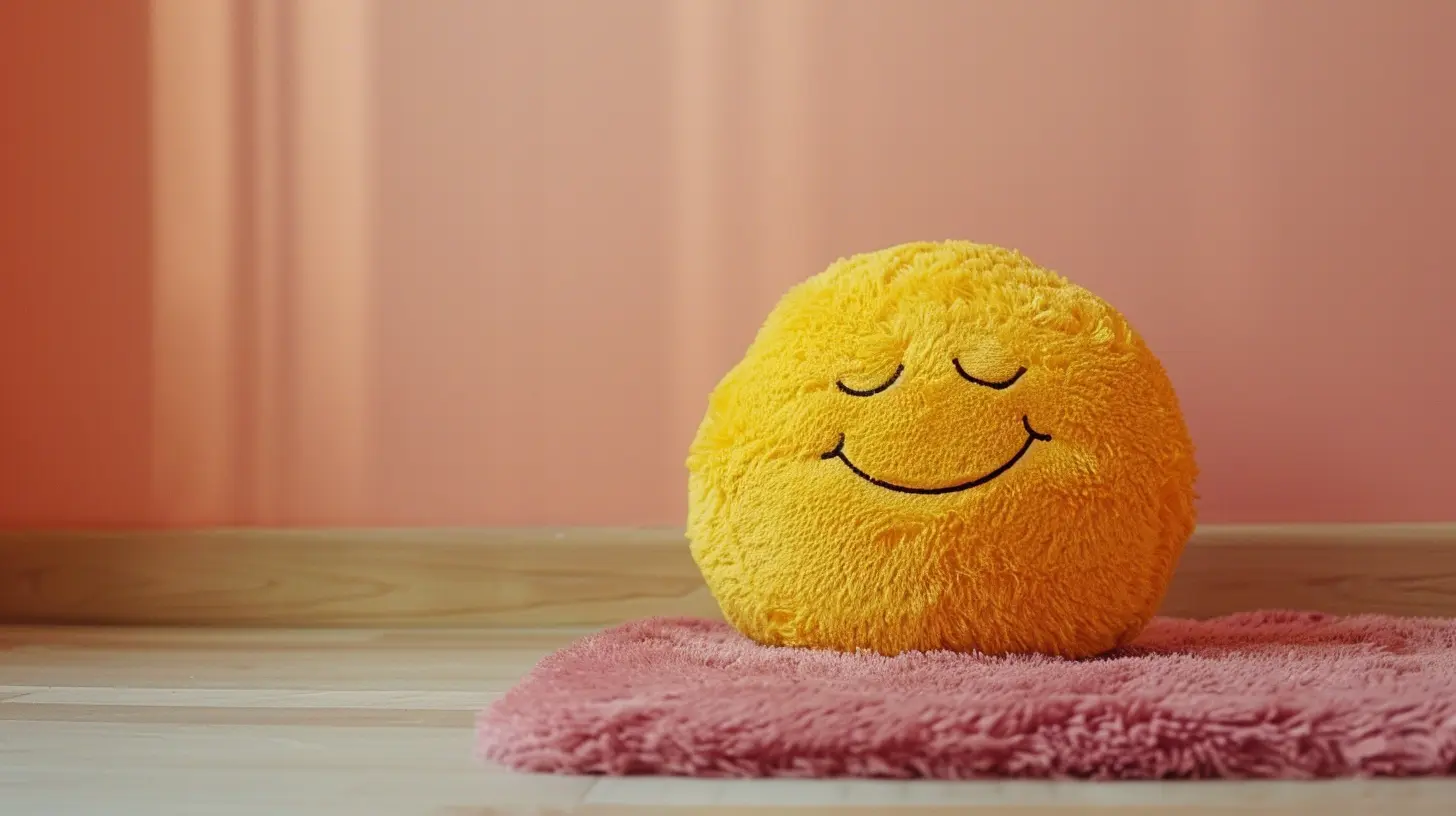The Role of Humor in Alleviating Teacher Stress
25 December 2024
Let’s face it – teaching is no walk in the park. Whether you're wrangling a classroom of energetic kindergartners or guiding high school seniors through complex calculus, the demands on teachers are immense. From grading papers to managing classroom behavior, not to mention the pressure of standardized testing, teachers face a daily grind that can easily lead to burnout.
But what if there was a magic trick to ease some of that stress? Something simple, free, and always available? Well, there is—and it's called humor.
In this article, we’ll explore the role of humor in alleviating teacher stress, how it can transform the classroom environment, and why laughter might just be the best medicine after all. So, grab a snack, sit back, and let’s dig into why humor is a game-changer for stressed-out teachers.

Understanding Teacher Stress: More Than Just a Bad Day
Before we dive into the giggles, let’s talk about teacher stress. It’s not just about feeling frazzled on a bad day. Teacher stress is a very real and prevalent issue that impacts educators around the world. From the outside, teaching might seem like a rewarding profession, but behind the scenes, many teachers are dealing with:- High workloads: Endless lesson planning, grading, and administrative tasks.
- Emotional exhaustion: Managing diverse student needs and behaviors.
- Pressure to perform: Standardized testing, evaluations, and reaching academic benchmarks.
- Lack of support: Sometimes, teachers feel they don’t receive enough backing from administration or parents.
All of this can take a toll, leading to burnout, decreased job satisfaction, and even teachers leaving the profession altogether. But here’s the good news—humor can help.

Why Humor Works: The Science Behind Laughter
You’ve probably heard the saying “laughter is the best medicine,” and it turns out, there’s some truth to that. Studies have shown that laughter triggers the release of endorphins—those feel-good hormones that help reduce stress and improve mood.According to the American Psychological Association, humor has been found to:
- Reduce stress hormones like cortisol and adrenaline.
- Boost immune function through increased antibody-producing cells.
- Improve cardiovascular health by increasing blood flow.
- Enhance mood and resilience, helping individuals cope with daily challenges.
In short, humor doesn’t just make us feel good in the moment—it has long-term benefits for both physical and mental health. And for teachers, it can be a secret weapon in combating the everyday stressors of the job.

How Humor Helps Alleviate Teacher Stress
So, how exactly does humor alleviate teacher stress? It’s not just about cracking jokes or watching funny videos during your lunch break (though that can help too). Humor can be integrated into various aspects of the teaching profession, both inside and outside the classroom. Here’s how:1. Fostering a Positive Classroom Environment
A classroom filled with laughter is a classroom where students feel safe, comfortable, and engaged. When teachers use humor, it can help break down barriers between them and their students, creating a more relaxed and open learning environment.Think about it: when you were a student, didn’t you feel more connected to teachers who could crack a joke or tell a funny story? Humor humanizes teachers, making them more approachable and relatable. And when students feel comfortable, they’re more likely to participate, ask questions, and engage with the material.
This positive atmosphere can reduce the stress of managing classroom behavior. Instead of feeling like you’re constantly battling with students, humor can diffuse tense situations and redirect focus in a lighthearted way.
2. Building Resilience and Coping with Challenges
Teaching is full of unexpected challenges—students not understanding the material, technology failing at the worst possible moment, or a surprise observation from the principal. These moments can be incredibly stressful, but humor can help teachers roll with the punches.By maintaining a sense of humor, teachers can build resilience. When something goes wrong, instead of panicking or getting frustrated, they can laugh it off and move forward. This ability to "bounce back" is crucial in preventing burnout. After all, if you can’t laugh at a spilled coffee on your lesson plans, how will you survive the rest of the day?
3. Connecting with Colleagues
One of the best parts of being a teacher is the camaraderie with your fellow educators. Sharing a laugh in the teachers' lounge or swapping funny classroom stories can help build strong relationships with colleagues. And those relationships are key for reducing stress.When teachers feel supported and connected to their peers, they’re better equipped to handle the ups and downs of the job. Humor acts as a glue that binds people together, creating a sense of community and shared understanding. It’s much easier to face a tough day when you know you can laugh about it with a colleague during lunch.
4. Promoting Mental Health and Well-Being
At its core, humor is a powerful tool for promoting mental health. By making humor a regular part of their routine, teachers can reduce anxiety, improve mood, and maintain a healthier outlook on life.Laughter provides a mental break from the stress and chaos of the classroom, offering a moment to recharge. And when teachers feel better mentally, they’re more present, engaged, and effective in the classroom.

Practical Ways to Incorporate Humor into Teaching
Now that we’ve established the benefits of humor, let’s talk about how to actually incorporate it into your daily teaching practice. You don’t have to be a stand-up comedian to use humor effectively—just a few small shifts can make a big difference. Here are some practical strategies:1. Start with Self-Deprecating Humor
One of the easiest ways to incorporate humor into your teaching is through self-deprecation. By poking fun at yourself (in a light, non-harmful way), you show your students that it’s okay to make mistakes and not take yourself too seriously. For example, if you make a typo on the board, you can joke about how "even teachers make mistakes."Not only does this make you more relatable, but it also sets a tone of humility and openness in the classroom.
2. Use Funny Examples or Analogies
When teaching complex concepts, consider using humorous examples or analogies to explain them. It can make abstract ideas more relatable and memorable for students. For instance, you might compare a mathematical equation to a “complicated love triangle” or describe a historical figure as a "celebrity of their time."This not only lightens the mood but helps students grasp difficult material more easily.
3. Incorporate Comedy Clips or Memes
In the age of the internet, memes and funny video clips are gold for engaging students. If appropriate, consider incorporating a relevant meme or short funny video into your lesson to illustrate a point. For example, a meme about procrastination can be used to start a discussion on time management skills.Just make sure the humor aligns with the lesson and doesn’t distract from the main objectives.
4. Laugh at Yourself and Your Mistakes
This is a big one. Sometimes things don’t go as planned, and that’s okay! Instead of stressing over minor mishaps, laugh at them. If your projector isn’t working or you accidentally call a student by the wrong name, laughing it off can ease the tension and remind everyone that mistakes happen.Being able to laugh at yourself shows students that failure is not the end of the world—it’s a learning opportunity.
5. Encourage Students to Share Jokes or Funny Stories
Why not let your students get in on the fun? Encouraging them to share (appropriate) jokes or funny stories can create a sense of community and give everyone a much-needed break from the seriousness of learning. You could even have a “Joke of the Week” or dedicate a few minutes at the start of class to some lighthearted humor.This fosters a positive, welcoming classroom environment where students feel more at ease.
Balancing Humor with Professionalism
While humor is a fantastic tool for alleviating stress, it’s important to strike the right balance. Not every moment calls for a joke, and it’s crucial to maintain professionalism, especially when dealing with sensitive subjects or serious classroom issues.Here are a few tips for balancing humor with professionalism:
- Know your audience: What’s funny to a group of high school seniors might not land with third-graders. Tailor your humor to the age and maturity level of your students.
- Be mindful of boundaries: Avoid humor that could be seen as offensive, inappropriate, or hurtful. The goal is to create a positive, inclusive environment.
- Use humor sparingly: While humor is a great tool, overdoing it can be distracting. Make sure it enhances your teaching, rather than overshadowing it.
Conclusion: Laughter as the Best Stress Reliever for Teachers
At the end of the day, teaching is a tough job—there’s no denying that. But by incorporating humor into your daily routine, you can alleviate some of the stress and make the classroom a more enjoyable place for both you and your students.Whether it’s sharing a funny story, laughing at your mistakes, or simply taking a moment to enjoy a lighthearted moment with colleagues, humor can be your secret weapon in the fight against teacher stress.
So, next time you’re feeling the weight of the job, remember: sometimes, a little laughter goes a long way.
all images in this post were generated using AI tools
Category:
Teacher Burnout PreventionAuthor:

Bethany Hudson
Discussion
rate this article
16 comments
Soleil McWhorter
This article insightfully highlights how humor can serve as a vital coping mechanism for teachers. By fostering a light-hearted classroom atmosphere, educators can effectively manage stress and enhance their overall well-being. Great read!
March 28, 2025 at 9:42 PM

Bethany Hudson
Thank you for your kind words! I'm glad you found the article helpful in highlighting the importance of humor for teachers' well-being.
Jade Hughes
This article highlights the importance of humor in education, illustrating how it can effectively reduce stress for teachers. Incorporating lighthearted moments can enhance well-being, foster positive relationships, and create a more enjoyable learning environment.
February 13, 2025 at 12:08 PM

Bethany Hudson
Thank you for your insightful comment! I'm glad you found the importance of humor in education highlighted in the article. It truly can transform the classroom experience for both teachers and students.
Wren Oliver
What fascinating insights! How can we effectively integrate humor into teaching routines to enhance stress relief for educators?
January 31, 2025 at 7:45 PM

Bethany Hudson
Thank you! Integrating humor can be as simple as sharing funny anecdotes, incorporating light-hearted activities, or using humorous visuals in lessons. Regularly fostering a supportive environment where laughter is welcomed can significantly enhance stress relief for educators.
Zephyrine Warner
In laughter's light, burdens grow small, A teacher’s heart, uplifted, stands tall. In jest and joy, stress finds retreat, Humor’s embrace makes the journey sweet.
January 29, 2025 at 4:17 AM

Bethany Hudson
Thank you! I completely agree—humor truly transforms stress into a lighter experience for teachers, fostering resilience and connection.
Lysander Abbott
Humor serves as a powerful coping mechanism in education, fostering resilience and connection. By integrating laughter into the classroom, teachers can transform stress into camaraderie, enhancing both well-being and student engagement.
January 26, 2025 at 1:25 PM

Bethany Hudson
Absolutely! Humor not only relieves stress but also strengthens classroom bonds, creating a more supportive and engaging learning environment.
Pamela Weber
What a delightful read! Embracing humor is like adding a sprinkle of magic to the teaching journey. It not only lightens the mood but also strengthens connections with students. So, let’s share a laugh or two – it’s the best remedy for stress! Keep smiling, educators! You’ve got this!
January 21, 2025 at 4:12 AM

Bethany Hudson
Thank you for your lovely comment! I completely agree—humor truly enhances the teaching experience and fosters stronger connections. Let's keep spreading those smiles!
Uriah Jacobs
What a delightful read! Humor truly is a powerful tool for teachers. It lightens the mood, fosters connections, and creates a positive classroom environment. Let’s embrace laughter as a vital part of our teaching journey! Keep shining, educators!
January 15, 2025 at 4:58 AM

Bethany Hudson
Thank you for your kind words! I completely agree—humor is essential in creating positive connections and reducing stress in the classroom. Let's keep spreading the joy!
Delia Cole
Humor is a powerful tool for teachers; it not only alleviates stress but also fosters a positive classroom environment that enhances learning and connection.
January 7, 2025 at 7:25 PM

Bethany Hudson
Absolutely! Humor truly transforms the classroom, making learning enjoyable and strengthening bonds between teachers and students.
Melissa McTigue
This article beautifully captures the power of humor in our teaching lives. It serves as a reminder that laughter can lighten our burdens and foster resilience. Thank you for highlighting such an essential tool for nurturing both ourselves and our students!
January 4, 2025 at 5:24 AM

Bethany Hudson
Thank you so much for your kind words! I'm glad you found the article meaningful and that it resonated with you. Humor truly is a powerful tool in education!
Kathleen Peterson
Great insights! Humor truly is a powerful tool for teachers.
December 30, 2024 at 1:20 PM

Bethany Hudson
Thank you! I'm glad you found it insightful. Humor can indeed be a game-changer in the classroom!
Siena Gomez
Great insights! Humor can truly be a powerful tool for teachers, helping to create a positive environment and lighten the emotional load. Keep spreading the joy!
December 29, 2024 at 9:06 PM

Bethany Hudson
Thank you! I'm glad you found it insightful. Humor really does make a difference in both teaching and learning environments!
Mabel McGinnis
What a fantastic read! Humor truly is a powerful tool for teachers. It not only lightens the atmosphere but also fosters connection and resilience in the classroom. Thanks for sharing these valuable insights!
December 28, 2024 at 12:34 PM

Bethany Hudson
Thank you! I'm glad you found it valuable. Humor really does make a difference in the classroom!
Sarah Edwards
Why did the teacher bring a ladder to class? To reach new heights of humor! Laughter really is the best lesson plan—because who can grade when they're giggling uncontrollably?" 😂📚
December 27, 2024 at 1:47 PM

Bethany Hudson
Humor, like a ladder, elevates the classroom atmosphere, helping teachers cope with stress while fostering connection and engagement. Laughter truly is an essential tool in education!
Yolanda Collins
This article beautifully highlights the importance of humor in the teaching profession. Embracing laughter not only lightens the atmosphere but also fosters resilience among educators. Thank you for shedding light on such a vital aspect of teaching!
December 27, 2024 at 5:24 AM

Bethany Hudson
Thank you for your kind words! I'm glad you found the article insightful. Humor truly is a powerful tool in education!
Pilar Rocha
In laughter's embrace, we find our light, A balm for weary souls, taking flight. Humor weaves joy through lessons learned, Transforming stress with each smile earned, In teaching’s dance, let laughter ignite.
December 26, 2024 at 9:48 PM

Bethany Hudson
Thank you for capturing the essence of humor's healing power in teaching! Laughter truly is a vital tool for easing stress and fostering connection in the classroom.
Mallory Sullivan
“Who knew laughter could be a superhero in the classroom? Forget capes—teachers wield punchlines! Let's sprinkle some giggles on that grading pile and watch stress fly away like confetti!”
December 25, 2024 at 7:59 PM

Bethany Hudson
Absolutely! Humor is a powerful tool that not only lightens the mood but also fosters connection and resilience in the classroom. Let's celebrate the joy it brings!
MORE POSTS

How to Stay Motivated When Learning English as a Second Language

Building Emotional Intelligence to Navigate Teaching Stress

Exploring the Future of Blended Learning in Corporate Training

How to Use Flashcards Effectively in Learning English

Mastering Problem-Solving Skills for Real-World Challenges

How to Use Learning Management Systems for Blended Learning

Strategies for Effective Classroom Leadership

Learning English with Music: Songs That Teach Grammar and Vocabulary

Collaborating Across Cultures: Global Projects in the Classroom

The Intersection of Teaching and Leadership: How to Grow in Both Areas